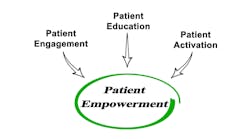The Secretary of the Department of Health and Human Services (HHS) may be asked to move toward certification of personal health records, perhaps through the same avenue that was initiated for ambulatory electronic medical records (EMRs) last year and will begin soon for hospital-based records.
Personal health records (PHRs) are controlled by the patient and may be kept on the Internet, on a flash drive or other storage device or in another form. PHRs may house prescription records or health insurance records, for example, and could be shared with providers and others under the consumer's direction.
In play
PHRs were on the radar in Washington last year. At the behest of the American Health Information Community (AHIC), they were one of the first three arenas targeted for national interoperability specifications. Chosen by the Health Information Technology Standards Panel (HITSP), those first standards were presented last October. The specifications for PHRs include standards for establishing permissions for viewing data, for querying other organizations and for matching records to the consumers, among others.
At the end of 2006, PHRs received a lift when a coalition including Bentonville, Ark.-based Wal-Mart announced plans to offer them to employees. At almost the same time, health insurance plans covering a majority of American beneficiaries followed suit, promising to develop PHRs that will be interoperable among all plans.
In January AHIC accepted a recommendation from its Consumer Empowerment Workgroup, to be forwarded to HHS, that the department should promote consumers' access to their personal health information in the trial implementations of the National Health Information Network, a major project supported by AHIC.
Time for certification?
But the Consumer Empowerment Workgroup also indicated it may come back with a recommendation that the Certification Commission for Health Information Technology (CCHIT) move toward setting requirements for approval on PHR products, as it has done for ambulatory health records, after there has been adequate industry experience with them. PHR certification would cover aspects like privacy and interoperability.
The CCHIT certification is meant to assure buyers that an electronic program meets certain standards.
The workgroup explained that despite interoperability standards announced last fall, "When a consumer's PHR is tethered to an entity such as a health plan or a provider group ... the data typically cannot be transferred to a different PHR if the consumer switches to another plan or provider."
Access and privacy
Nancy Davenport-Ennis, head of the National Patient Advocate Foundation and co-chair of the Consumer Empowerment Workgroup, said the panel wants to hear more on certification before making a recommendation.
AHIC agreed in January that its consumer panel and its privacy workgroup should develop principles for privacy related to interoperable PHRs, in particular to ensure that when information moves, the restrictions a consumer puts on it also moves.
In a letter to the secretary, AHIC also asked that the HHS Office of Civil Rights should provide guidance under HIPPA on the right of consumers to access their electronic personal information beyond existing rules.
AHIC noted that, "Ideally, personal health data can be exchanged among PHRs and sources of personal health information under the control of the patient while preserving the meaning of the data."
In the meantime, a spokesperson for Rep. Patrick Kennedy's (D-R.I.) office said he will re-introduce his bill to give physicians financial incentives for using PHR systems. Originally introduced last fall, the bill would also require HHS to set privacy, security, interoperability and other standards for PHRs.
Online discussions regarding PHRs and related products can be found at http://www.myphr.com. Information on the deliberations of the AHIC Consumer Empowerment Workgroup is at http://www.dhhs.gov/healthit/ahic/consumer.
Author Information:Kathryn Foxhall is a contributing writer based in Hyattsville, Md.
